Translated by: OneFlow
Generative AI is rapidly intervening in the human world. As AI big models continue to advance, we are facing huge social changes.
This article explores a world dominated by highly intelligent agents and robots - the world of AI Atlantis (referring to almost unlimited AI resources in the digital field). This article analyzes why current AI models are fundamentally different from previous technological paradigms, how they reshape industries, and the key choices facing humans.
The author believes that everyone must understand how the advancement of AI will reshape the rules of the economy, creativity, and human potential. Unless AI is democratized, a few entities will monopolize and control these transformative technologies (or power). Today's choices will determine whether AI enhances or weakens human autonomy and freedom. This article explores this in depth, while calling on people to take action to actively and wisely participate in the challenges and opportunities brought by AI.
This article is from Intelligent Internet, a company founded by Emad Mostaque, founder of Stability AI, to build open, distributed AI systems.
1Foreword
Currently, a handful of people will determine the future of AI. They have the power to control every aspect of our lives. Global investment in AI is expected to reach $200 billion by 2025. [1] Yet, the magnitude of the change we are about to face is little known. A new type of AI is being created that will completely change the way human society exists.
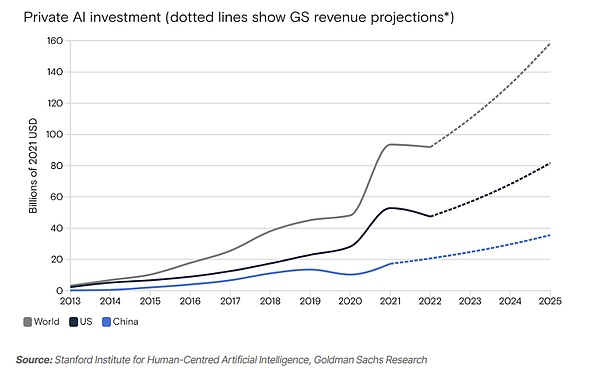
Let’s be clear: Humanity is at the beginning of the most transformative event in history. This article is more than just a prediction of the technology; it is a wake-up call, a roadmap, and a vision for the future.
Here’s what you need to know:
AI is about to explode.100 billion AI agents and a billion robots will soon be a reality.
Current AI models are just the appetizer.This is a tipping point where AI’s capabilities will soon surge at an unimaginable pace, and today’s technology will look like Stone Age tools.The profound impacts AI will have on culture and society are beyond most people’s imagination and preparation.
No industry will be immune.From software to creativity, finance to pharmaceuticals, AI will change the very nature of work and society.
Once thought to be the last to be replaced by AI technology, the creative industries are now bearing the brunt of it.
The cost of intelligence is plummeting.The value of human creativity in applying this new resource will soar, and it will soon become one of your most important skills.
Urgent and decisive action is needed now. We need to ride this AI wave, reap its benefits, and mitigate its risks.
This article will provide you with the mental models and insights you need to navigate the coming AI wave. You may agree or disagree, but this is the objective reality we face.
Do you think this is an exaggeration? The global generative AI market will reach $1.3 trillion by 2032, growing more than 13 times in the next seven years. [2]
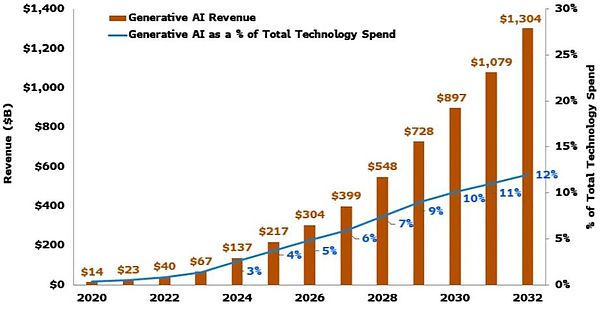 AI brings unimaginable challenges and opportunities, and this article is your crash course in understanding the future. We will explore different AI models, their impact on knowledge, and the impact on society and individual technological autonomy.
AI brings unimaginable challenges and opportunities, and this article is your crash course in understanding the future. We will explore different AI models, their impact on knowledge, and the impact on society and individual technological autonomy.
We must act now. AI Atlantis is rising. [3]
2 AI College Students
Imagine that overnight you woke up to a “new world”: a digital realm of 100 billion AI agents and 1 billion robots. Welcome to the world of AI Atlantis: a seemingly unattainable utopia that is actually a vivid reality unfolding before our eyes.
Here’s an incredible thought: you can now hire agent and robot workers for less than you spend on a cup of coffee—and yet they have the same skills as the average college graduate. This is a major shift that will completely change the structure of our economy and society.
If you’re saying to yourself, “That’s impossible,” or “AI will never get to that level,” then you can stop reading. We’re calling for rational thinking here, and if you disagree with this mental model, then the rest of this article may be hard to swallow.
For those who believe in the iron law of supply and demand, be prepared. We are about to turn Keynesian economics on its head. When you have virtually unlimited, organized intelligence available at virtually no cost, all around the world, traditional rules no longer apply.
We have only scratched the surface of AI’s potential. What you are seeing is the impending (and inevitable) tipping point where AI’s capabilities will explode in a way that will make current models look primitive.
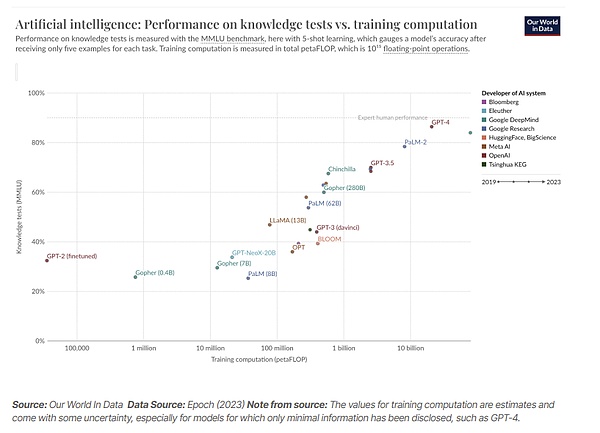
If you don’t believe the rapid pace of AI development, take a look at GPT-3.5 and GPT-4 in the image above. These two models were released less than a year apart, yet the amount of training compute has increased by nearly 10x.
Today’s AI models are more than just advanced calculators — they are pure reasoning engines (more on that later). Think of them as Prometheans, bringing limitless creativity and problem-solving capabilities to humanity.
Using generative AI, ordinary people instantly become geniuses. Imagine holding a window to all human knowledge in your hands. In fact, you don’t have to imagine it; it’s happening already.
Its impact is already permeating every industry. More than half of US companies are already using generative AI in some way[4]. For example, PwC has invested $1 billion to train 65,000 US employees on GPT-4 integration. [5]
There’s an obvious problem here—jobs. AI automation puts 300 million full-time jobs at risk. [6]
But before you panic, remember: new AI-related jobs are emerging at a rapid pace. By 2025, AI applications will create 97 million jobs across all industries: automotive, energy, healthcare, mining, and more. [7] The key is adaptability and continuous learning.
The cost of intelligence is plummeting, but the value of human creativity in applying this unique resource will soar. Those who excel in working with AI will thrive in this new world.
AI Atlantis is rising. The question is not if it will happen, but how to ride the wave.
The future is already here, and it’s wilder than we can imagine.
3 Information Flow
Modern AI models have created a new type of technology that can understand and generate human language, create art, and solve complex problems. Why are they so revolutionary?
These AI models are more than just advanced calculators or simple logic machines. They are able to process and generate information in ways that mimic human cognition. Even more amazing is that they are able to do this to an incredible level.
Imagine that a publicly available large language model (LLM) can be trained on trillions of tokens. If someone compressed these tokens into a regular zip file, they would take up thousands of gigabytes of space. Yet, the final model might be only a few dozen gigabytes in size—almost entirely stored in a single file.
The model is able to do this because it learns patterns from the training data, rather than just storing the data for later retrieval. The responses generated by the AI model are comparable to the original data, but by no means a perfect replica.
It’s like carrying a library with you. Look at how Tesla replaced 300,000 lines of Autopilot code with a single AI model. [8] The new model was 100 times smaller in size—most of the storage space was used to store a single model weight file. This is a huge change in the way information is processed.
These models are universal translators. By taking in one form of input, whether it’s text, images, or code, they can convert it into another form. They can explain complex concepts to a five-year-old or rewrite Shakespeare in rap style.
Give these models any context and they will adapt, and it’s this versatility that makes them so powerful and so applicable across industries. And so essential.
Daniel Kahneman proposed a concept that helps explain how these models work. [9] He describes two types of thinking:
System 1: Fast, instinctive, emotional
System 2: Slow, logical, computational
Today’s generative AI models excel at System 1. They can quickly generate responses based on learned patterns, just as you might instinctively react to a sudden noise or blurt out a familiar phrase. As a result, they can generate human-like text or images almost instantly.
Interestingly, as these models evolve, they begin to exhibit capabilities similar to System 2 thinking—a unique characteristic that was previously limited to non-generative AI, such as chess-playing bots or spam filters.
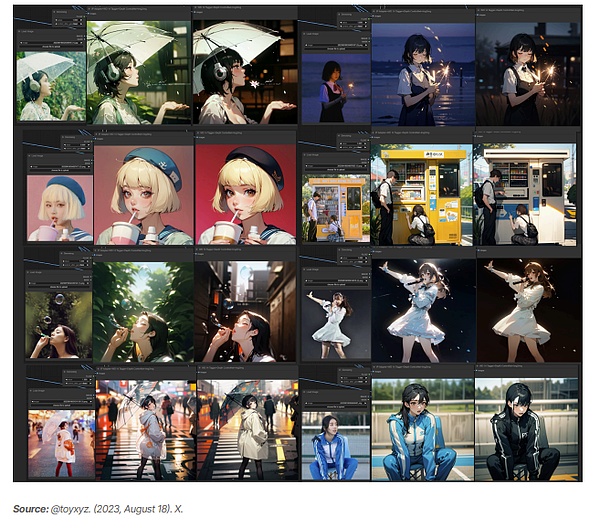
We are moving from a world of static files to a world of dynamic information flows. With the introduction of AI, we are entering a world where information is constantly being updated, combined, and repurposed in real time. This changes the relationship that individuals have with information.
Tools like ComfyUI are early examples of this shift – people can now create complex AI workflows where information and tasks flow seamlessly from one stage to another. As soon as a parameter changes, downstream processes automatically adapt.
This means that we can process information and generate new ideas at unprecedented speeds.
The result of all this? A dramatic increase in the speed of knowledge flow. Whether you are an individual, an organization, or a society, these AI models give you the ability to process, understand, and exploit information at a speed and scale that has never been possible before. They are the tools that give us new thinking and, ultimately, the ability to create at the speed of thought.
The key to all this is autonomy. Using these tools, we have more choices, more capabilities, and more power to transform the world than ever before.
Sceptics might say, “But these models make mistakes. They don’t understand or reason like humans do.” They’re right – in a way, these models are not perfect. They do “hallucinate” and lack the deep understanding of humans.
…yet they are improving at an astonishing rate. Despite their current limitations, when combined with human intelligence, they are already transforming industries and changing the way we work and live.
These AI models will amplify human potential in ways we are only beginning to understand.
The question is not whether they will change the world. The question is: are you ready for the world they create?
4 Agency vs. Autonomy
Let’s talk about capabilities. Not the kind that turns on the lights in your house, but the ability to reshape the world. We’re talking about agency—the ability to shape your destiny, and AI is poised to dramatically increase that.
Imagine life as a big buffet. Before AI, most people only had a fork and, if they were lucky, a spoon. But now? AI is handing out Swiss Army knives to everyone. It’s not just about having more tools, it’s about having the right tools for any situation. This is essentially increased autonomy.
We’re not talking about AI replacing humans, but AI and humans combined — the “Centaurs.” Centaurs are not just humans using AI, it’s a symbiotic relationship where each amplifies the strengths of the other. Human creativity and intuition combined with AI’s processing power and precision is like giving Einstein a supercomputer.
The key is: when the task is within the AI’s capabilities, the Centaurs outperform a single human.
The team of humans and AI outperforms a single human[10] — a quantum leap in human capabilities.
So how exactly does AI increase individual autonomy?
Explosive increases in efficiency. AI enhances the ability of each individual to perform. Tasks that once took hours now take minutes. Complex problems that once baffled you are now solvable. It’s like having a team of expert assistants on call, at your service every hour, every day.
Time: The ultimate luxury. By automating mundane tasks and speeding up complex problems, AI frees up humanity’s most precious resource—time. Having more free time is nice, but the real key is that AI frees up mental space for you to focus on bigger challenges.
Unlimited Choices. AI broadens horizons, making skills that were once out of reach now within reach. Want to code but never learned? AI can help you. Need to understand complex data? AI can do the math for you. It’s essentially a passport to a new world of opportunity.
Here comes the fun part, and it can be pretty scary. Increased autonomy isn’t just happening at the individual level. AI is accelerating empowerment for businesses and governments, too.
For businesses, AI means unparalleled efficiency and innovation potential, but it also means they’ll need fewer employees. Look at tech companies, which are making more money with fewer employees.
Governments with AI are able to provide better services, develop data-driven policies, enhance national security, and provide greater transparency and accountability to their citizens. However, there’s a flip side to this: the potential for total surveillance and control. Remember, it’s often said that governments have a monopoly on violence. Now, imagine entities with AI-enhanced capabilities.
The AI revolution is like a tsunami, and the waters are already receding from the coast. Some are still playing on the beach, oblivious. Others are running for high ground. But the smart ones? They’ve already reached high ground.
Here’s the truth: You can choose not to engage with AI, bury your head in the sand, and hope this will pass, but you’re also choosing to fall behind. You’ll be outcompeted, outthinked, and outstrategized by those who embrace AI.
AI’s ability to enhance human autonomy is the most significant development in human history since the invention of writing. It’s like Gutenberg’s printing press, but grander. It’s the Age of Enlightenment on speed.
But with great power comes great responsibility (yes, we’re quoting Spiderman, get it). Humanity stands at a crossroads, and the choices we make now will determine our future.
Will AI-enhanced autonomy lead to a renaissance of human creativity and problem-solving? Or will it exacerbate existing inequalities and generate more forms of oppression?
The answer is yet to be determined. It’s up to all of us.
In this unexplored world, you may have more power than we ever dreamed possible. What will you do with it?
5 Crossroads
This is a critical moment in human history. The choices we make today will impact generations and shape the fundamental face of human existence.
The most important decision facing humanity is whether to pursue an open, collaborative path for AI development, or to allow it to remain in the hands of a few? As AI Atlantis approaches, the growing AI divide cannot be ignored—these technologies will increasingly determine the dynamics of power in economies and societies.
We believe that democratizing AI is not only preferable, it is essential.
Why? Consider:
Diverse perspectives ensure that AI meets the needs of society as a whole, not just the priorities of tech giants or governments.
Open source development builds trust. It allows for more transparent scrutiny and minimizes the risk of hidden biases, single points of failure, or unintended consequences.
Collaboration accelerates innovation. The collective wisdom of a global community will always outpace closed corporate R&D.
Broad participation keeps ethical questions at the core. Ethical questions should not be sidestepped in the design and implementation of AI.
The alternative? A world where AI becomes the new oil, controlled by digital tycoons with a monopoly over the most powerful tool humanity has ever created.
Is that the future you want?
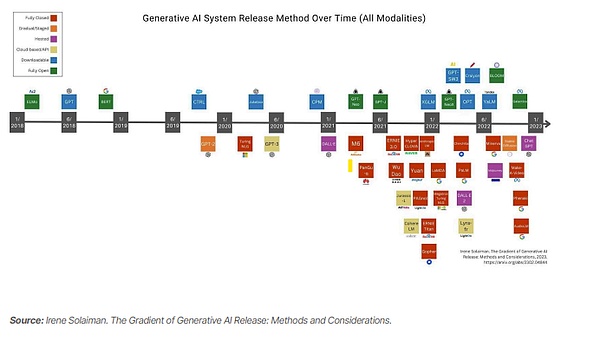
We must act quickly, deeply, and thoughtfully. Here are the actions that must be taken:
Invest in AI education at all levels of society. No meaningful debate about the future can take place if most people don’t understand the basic concepts.
Develop strong ethical guidelines and regulations. Apply to the development and deployment of AI. These guidelines must be flexible enough to keep up with the rapid pace of development.
Rethink the economic model to address the inevitable job losses and inequality. Informed citizens and policymakers need to make data-driven decisions together.
Drive international cooperation. Ensure the benefits of AI are shared globally. AI Atlantis should be the tide that lifts all boats, not just the luxury yachts of Silicon Valley and Wall Street.
The conclusion is that while the era of generative AI has only just begun, it has already reached world-changing performance levels that will reshape the fabric of our society. Society needs to act quickly to mitigate risks and capitalize on opportunities to address these pressing issues.
The power to shape an AI-driven future lies in the hands of humans. Will it be used to amplify or diminish human nature? Will you help create a future where technology is the bridge that promotes better understanding, innovation, and prosperity for all?
The choice is ours. If AI is to shape humanity’s future, then all of humanity needs to be involved in shaping it.
6 Conclusion
AI’s time has arrived, and it’s advancing faster than most people can comprehend. Again, we’re not talking about the distant future, we’re talking about the present. The choices we make today will determine whether AI is our greatest ally or our greatest challenge.
What we want you to remember is this:
AI Atlantis is rising. A hundred billion agents and a billion robots are within reach—all as capable as college graduates—and are an imminent reality.
Existing models are just the beginning. We are on the cusp of an explosion in AI capabilities that will make today’s technology look archaic.
The nature of work, creativity, and problem solving are changing. From software to healthcare, education to entertainment, industries are at the cusp of change.
Individual autonomy will increase dramatically. AI will give people more choice, time, and capabilities than ever before. So what should we do?
Society needs to act in a way that is both swift and thoughtful:
Invest in AI education and literacy. For everyone, even your grandmother needs to understand this.
Promote an open, collaborative approach to AI development. This power should not be monopolized by tech giants or governments.
Rethink our economic model. Old economic paradigms are breaking down, and new frameworks are needed to address the reality of AI Atlantis.
Set standards for AI ethics and regulation. Ensure AI enhances human potential, not diminishes it.
Encourage global collaboration. AI knows no borders and requires a global effort to address challenges and capitalize on opportunities.
The reality is that AI will change everything: the way humans work, the way they are creative, the way they solve problems. The way we all live.
We still have a choice. Together, we can shape this change. We can steer it toward a future where AI augments human creativity, solves our greatest challenges, and demonstrates incredible possibilities.
Or, we can move toward a worse future where AI exacerbates inequality, erodes privacy, and leaves many behind.
The choice is ours, but we must decide now. Not next year, but now.
So what are you going to do? Sit back and watch AI take over our world, or are you willing to help shape the future?
We have made the choice: to shape a future where AI empowers humanity. Will you join us?
Let’s make AI Atlantis a paradise, not a dystopia. We must ensure AI is built by the people, for the people, and with the people.
Appendix
[1]https://www.goldmansachs.com/intelligence/pages/ai-investment-forecast-to-approach-200-billion-globally-by-2025.html
[2]https://www.bloomberg.com/company/press/generative-ai-to-become-a-13-trillion-market-by-2032-research-finds/
[3]Friedman, N., “The AI Landscape: Last Year and the Next Years,” March 2024, Abundance Summit 2024, Abundance360, Los Angeles, CA.
[4]https://www.pwc.com/us/en/tech-effect/ai-analytics/ai-predictions.html
[5]https://www.gspublishing.com/content/research/en/reports/2023/03/27/d64e052b-0f6e-45d7-967b-d7be35fabd16.html
[6]https://www.gspublishing.com/content/research/en/reports/2023/03/27/d64e052b-0f6e-45d7-967b-d7be35fabd16.html
[8]https://x.com/elonmusk/status/1686513363495346178
[9]Kahneman, D. 2011. Thinking, Fast and Slow. New York: Farrar, Straus & Giroux Inc.
[10]https://doi.org/10.2139/ssrn.4573321
 Weiliang
Weiliang


 AI brings unimaginable challenges and opportunities, and this article is your crash course in understanding the future. We will explore different AI models, their impact on knowledge, and the impact on society and individual technological autonomy.
AI brings unimaginable challenges and opportunities, and this article is your crash course in understanding the future. We will explore different AI models, their impact on knowledge, and the impact on society and individual technological autonomy. 







